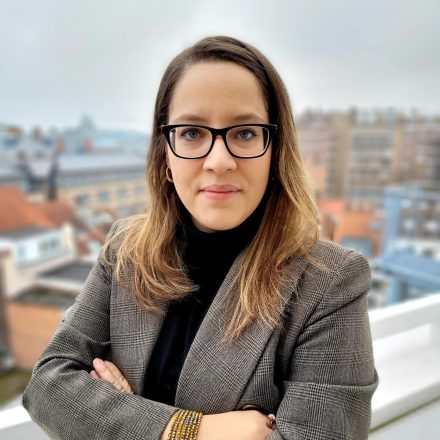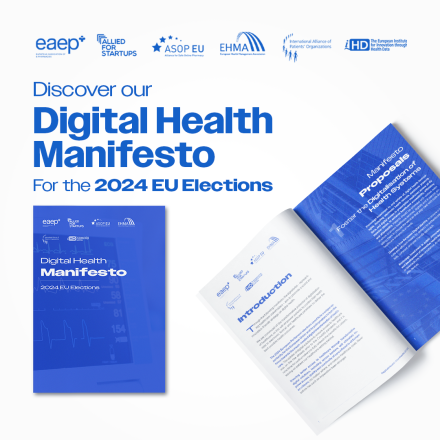This website uses cookies so that we can provide you with the best user experience possible. Cookie information is stored in your browser and performs functions such as recognising you when you return to our website and helping our team to understand which sections of the website you find most interesting and useful.
MULTI-ACT work presented at the project Final Conference
13 April 2021
The MULTI-ACT project worked to increase the impact of health research on people with brain diseases by creating a new model for the effective cooperation of all relevant stakeholders. The project worked with patients and patient organisations, academics, private and public stakeholders to develop brand new tools to assess the value of research. In March 2021, the MULTI-ACT project hosted its Final Conference to showcase the work done and the results achieved over the last three years. EHMA involvement in the project was principally focused on the development of guidelines for the Health Research and Innovation processes and the facilitation of stakeholder engagement.
On 23 March 2021, the MULTI-ACT project hosted its Final Conference to showcase the work done and the results achieved over the last three years. The MULTI-ACT project aimed to increase the impact of health research on people with brain disorders. The outcome is a new model, which allows for the effective cooperation of all relevant stakeholders and is applicable in defining the scope of Health Research and Innovation as well as new metrics for the evaluation of its results.
The MULTI-ACT Framework: key outcomes and principles
The conference was opened by Dr Paola Zaratin – Director of Scientific Research at the Italian Multiple Sclerosis Foundation and Coordinator of the MULTI-ACT project, who introduced the project objectives, ambitions, and outcomes. Dr Zaratin underlined the need to ensure sustainability in brain research through new multi-stakeholder and multidisciplinary managerial models in line with the Responsible Research and Innovation (RRI) approach to enable a unique health research ecosystem through patient participation. She concluded by mentioning how the MULTI-ACT project was listed as a model expected to produce institutional changes in participatory research and governance via an innovative co-accountability strategy.
The conference continued with two keynotes addressing the ‘what’, ‘how’, and ‘why’ of RRI by Dr René von Schomberg – European Commission, DG Research and Innovation, Open Science on Responsible Research and Innovation and Guest Professor at the Technical University Darmstadt – and Dr Ralf Linder – Head of the Department Politics and Society and Coordinator for Technology Assessment and Governance within the Fraunhofer Institute for Systems and Innovation Research ISI.
Dr Schomberg discussed the definition and rationale of ‘Open Science and how it is linked to the concept of Responsible Research and Innovation. He mentioned how RRI represents a new paradigm in which social systems institutionalise co-responsibility as a driving force for socially desirable innovation by giving innovation a direction and, whenever possible, shaping its characteristics. In the following keynote, Dr Ralf Linder discussed the policy developments that facilitated the emergence of RRI and its current presence at national and international policy levels. He mentioned that within R&I institutions, there is low awareness of the policy concept of RRI, but a high degree of openness to and interest in responsibility ambitions, as well as numerous RRI-related programmes in place, even if not explicitly called ‘RRI’.
Three representatives of healthcare research and innovation, Dr Elisabetta Verdun di Cantogno, Prof. Giovanni Leonardi and Dr Robert McBurney joined for a panel discussion moderated by Dr Usman Khan.
The panellists discussed the relevance of the RRI approach in their sectors. They all agreed that more work is needed to raise awareness on RRI, but that the COVID-19 pandemic facilitated a widespread recognition of its importance and implementation.
Finally, members of the project consortium presented the process used to develop the MULTI-ACT Collective Research Impact Framework (CRIF), described the components of the framework (the Governance Model, the Patient Engagement Guidelines and the Master Scorecard), and presented the legacy of the project, the MULTI-ACT Toolbox.

The closing panel with Prof. David Henshall, Mr Graham McReynolds, and Prof. Giancarlo Comi provided examples of the practical implementation of the MULTI-ACT model in multi-stakeholder initiatives: EPICLUSTER; the International Progressive MS Alliance; and the Multiple Sclerosis Care Unit (MSCU) of the European Charcot Foundation. The collaboration with the MULTI-ACT project enabled the initiatives to assess opportunities for improvement to establish and manage a structure with multi-stakeholder and accountable governance, and obtain concrete recommendations.
The conference concluded with the closing remarks of Dr Schomberg who summarised the key messages presented and shared the potential for upscaling the MULTI-ACT project.
READ THE EVENT REPORTThe MULTI-ACT project is funded by the European Union’s Horizon 2020 Research and Innovation Programme under grant agreement No 787570. This page and the publications contained herein only reflects the author’s views. The European Union is not liable for any use that might be made of the information contained in this page and publications.
Recent News

ENVI Committee voting on the EU Pharmaceutical Strategy

Appointment of new Interim Executive Director

Our Digital Health Manifesto for the European elections 2024
What our Members say
I have been active in EHMA since the first years of the '90s and I have seen its evolution from a small association of members interested in sharing knowledge on health management practices to the current status of reference and advisory key player for EU, health systems and organisations, stakeholders associations, industry and universities. EHMA is now a unique knowledge hub, policy advisor, community of practice and network of best in class organisations involved in health policy and management. A place where health managers can build their competences, policy-makers and stakeholder associations envision how to implement and sustain change through health management, industry leaders understand how to engage more effectively with health organisations and systems. The right place to nurture and grow health management capabilities and capacity for every stakeholder of health systems.
Prof. Federico Lega, University of Milan, Italy
Health management has a crucial function in shaping public health and health system challenges. The Medical University of Varna, Bulgaria had success in collaborating with EHMA on EU-funded projects that has resourced us to create new health management competencies for the future workforce. In addition to all classical definitions, health management is a science dealing with individuals, groups, and society at large. It is an art contributing to the beauty of our lives and an interactive communication process at all levels of institutions and human energy. I have also had the pleasure to chair the South Eastern European Special Interest Group which gives members a space to discuss and tools to address how health systems are managed in our regions.
Prof. Todorka Kostadinova, Medical University of Varna, Bulgaria
I enjoy the high level of interaction and engagement in EHMA’s activities, in particular during the annual conference where the panel discussions are rich and well prepared. As a hospital manager and professor of health management, EHMA motivates and inspires me to be creative. You go back home feeling energised from seeing old friends and making new connections, as well as being convinced of serving as EHMA’s ambassador. It’s a strong feeling of interdisciplinary engagement, but it also feels like being part of family-like community.
Prof. Sandra C. Buttigieg, University of Malta, Malta
EHMA is a pre-eminent organisation for everyone working in planning, managing and delivering health services across Europe. As a long standing member of EHMA I have always been impressed by the vibrant community of managers, researchers and academics it has created and by the many opportunities for sharing knowledge and funding opportunities it has brought to its members. Its international scope is impressive and its impact is often felt in management and research across European and national health systems.
Prof. Axel Kaehne, Edge Hill University, UK
Health workforce has become more essential in operating, managing and maintaining health systems lately, particularly in crisis and emergency situations. European healthcare professions and the workforce need to be high on the agenda of managers and decision makers. The Health Services Management Training Centre, Semmelweis University in Hungary is a longstanding EHMA member, because it connects us with collaborators and experts, with whom we can have complex debates, from whom we can learn and at the end find solutions in various challenging fields of healthcare management.
Dr Eszter Kovács, Health Services Management Training Centre, Semmelweis University, Hungary
As a hospital administrator and health management professor, I see on a daily basis that the healthcare challenges require talented and skilled managers to transform it. the EHMA membership has been beneficial to bring healthcare management research and education to the demanding healthcare services world, promoting healthcare management competencies and knowledge creation.
Dr Alexandre Lourenco, APAH - Association of Portuguese Hospital Managers, Portugal
Many healthcare systems in Europe and beyond are facing similar challenges which require innovative and creative solutions. EHMA’s annual conference, webinars, Programme Directors’ group and other activities and resources provide incredible opportunities for networking, connecting and sharing experiences. A distinct feature of EHMA is the diversity of members with representation from many countries, sectors and different communities of practice – academic, policy-makers, practitioners, managers, leaders and students. The annual conference is a highlight in the calendar year, offering a friendly, fun and learningful environment for emerging and established members to engage, collaborate and meet up with old and new friends. I am proud to be a member of the EHMA Board.
Prof. Ann Mahon, University of Manchester, UK
Society evolution, pandemics and ageing modify health needs. So, health policies and services are to change dramatically. EHMA, through webinars, workshops and annual conference provides an excellent insight to a professional changing world, favouring closeness to management innovation and the protagonists of these changes. As a primary care services’ manager, participating in EHMA activities is really worth it and allows to involve oneself in the innovation processes.
Dr Antoni Peris Grao, Consorci Castelldefels Agents de Salut (CASAP), Spain
